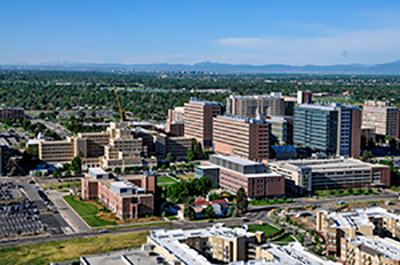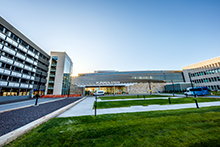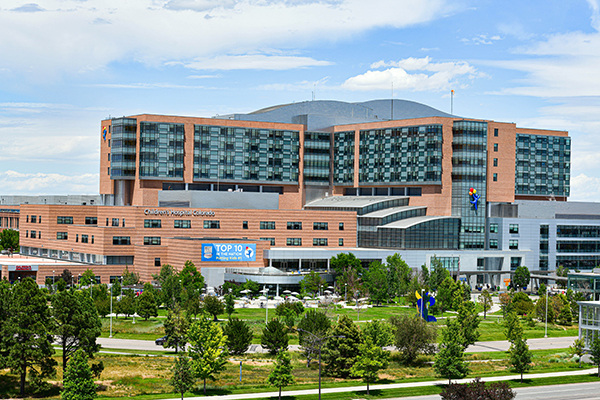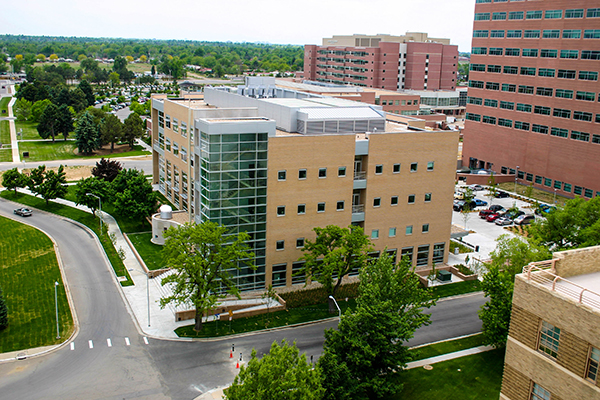Facilities
Training Facilities
We believe that one of the strengths of our training program is the diversity of the sites for both clinical and research training. Facilities for clinical and research training in Endocrinology, Metabolism and Diabetes are located at the Anschutz Medical Campus in Aurora, which includes the University of Colorado Hospital, the Rocky Mountain Regional VA Medical Center, the Anschutz Health and Wellness Center, Children’s Hospital Colorado, and the Barbara Davis Center for Childhood Diabetes, as well as atDenver Health Medical Center (DHMC) in central Denver. Each clinical site serves a unique population and therefore provides unique clinical experiences and research opportunities.

Anschutz Medical Campus

Rocky Mountain Regional Veterans Administration Medical Center

Children's Hospital Colorado

Barbara Davis Center
Clinical Facilities
The Department of Medicine at the University of Colorado has over 600 full-time faculty members and more than 300 residents and fellows. The Endocrinology fellowship’s clinical teaching activities utilize three Core teaching hospitals. The University of Colorado Hospital is a 700+ bed, quaternary care hospital that serves as the major teaching hospital of the University of Colorado. Located on the Anschutz Medical Campus, the University of Colorado has consistently been ranked the #1 hospital in Colorado and is nationally ranked in Diabetes & Endocrinology by U.S. News and World Report. The Rocky Mountain Regional Veterans Administration Medical Center, also located on the Anschutz Medical Campus, is approximately a 10-to-15-minute walk from UCH. Founded in 1860 as City Hospital, Denver Health Medical Center is Colorado’s primary “safety-net” institution; it is a modern acute care city and county hospital located approximately 9 miles from UCH, near the heart of downtown Denver. DHMC has been a leader in the National Association of Public Hospitals and is one of the healthiest “City and County” hospitals in the country. The center is a regional level I trauma center and contains 525 inpatient beds including medical and surgical ICUs and inpatient psychiatry unit. Each of these clinical facilities has inpatient endocrine consult services and outpatient clinics for clinical training activities of the Endocrine fellows.
Research Facilities
The Division of Endocrinology, Metabolism and Diabetes, occupies 16,000 sq. ft. of laboratory space located in the state-of-the-art Research One South complex on the Anschutz Medical Campus and 2,000 sq. ft. of both laboratory and office space at the VAMC. Additionally, there is an NIH-supported Clinical Translational Research Center (CTRC) located in the brand new Anschutz Health Sciences Building. Many inpatient clinical research studies are performed by fellows and Division members on the CTRC, which has a rich 42-year tradition and includes both an outpatient and an inpatient facility. The Barbara Davis Center (BDC) for Childhood Diabetes is a world leader in studies on the pathogenesis of type 1 diabetes and conducts ground breaking trials in the prevention and treatment of this condition in both children and adults. The Anschutz Health and Wellness Center (AHWC) contains state of the art infrastructure for clinical studies in nutrition, obesity and fitness.
Core Facilities
A number of Core Facilities are available to researchers including Core labs in Genetics, Clinical Investigation, Biostatistics, Flow and Confocal Cytometry, Laboratory and Transgenic Animal Core, Tissue Culture and Monoclonal Antibody Core, DNA and Sequencing Core, Pathology and Tissue Procurement Core, Fermentation Core, and Immunology Core.
The Fellows’ Office within the Division is equipped with desks and computer facilities, and is adjacent to the research laboratories.
Endocrine Training Faculty
Fellows in the research track undergo intensive first-hand participation in basic, translational and/or clinical research under the direct supervision of a primary faculty mentor with assistance and input from the Mentorship Committee and the Program Director. Clinical-educator fellows also participate in scholarly activity during their second year of training. The endocrinology training faculty are involved in diverse research areas and provide a wide spectrum of research opportunities.
The Endocrine Division faculty are actively engaged in clinical and/or basic research in various areas of clinical endocrinology, molecular endocrinology, reproductive endocrinology, hormones and cancer, childhood growth disorders, childhood diabetes, nutrition, metabolic bone disease, adult diabetes, obesity and lipid metabolism. From this wide range of research options each fellow’s research training experience can be tailored to their specific goals and integrated into the faculty mentor’s ongoing program of research. Please see our faculty webpage to learn more about our faculty and their research interests.